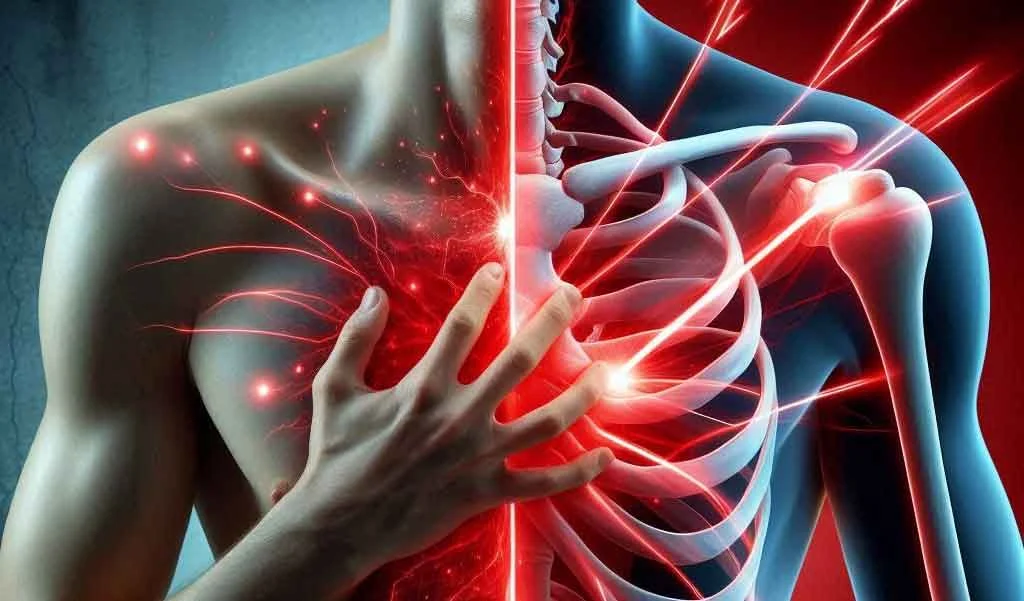A heart attack or myocardial infarction happens when there is a blockage in blood flow to some part of the coronary arteries. This can result in heart damage or tissue death. Heart attacks are usually portrayed very dramatically in films, but the truth is that they present differently and sometimes do not have a visible sign. If you can identify the early warning marks, it is then so essential to keep in mind that this is a symptom of a heart issue - with any luck early sufficient that something can be done about it.
1. Chest Pain: Not Necessarily Pain That Feels Like It's Crushing You
Crushing chest pain is how most people envision a heart attack. Not always, however. You could experience pressure or tightness, a squeezing sensation, or even a dull ache in your center. This pain can persist for more than a few minutes, or it can come and go. Not everyone develops chest pain. Especially in females, it may extend to other areas of the chest.
Why it Happens: The pain is induced by a failure of oxygenated blood to reach the heart muscle. This is typically because of a blockage within the coronary arteries.
What to Do: If you have chest pain that lasts longer than a few minutes or goes away and then lingers, call emergency services immediately.
2. Pain Outside the Chest: Vascular or Thoracic Signals
Though chest discomfort is the most common symptom, the pain may shift to other places during a heart attack. The pain might even spread to your shoulders, arms-the left one being quite particular-jointly with your back, neck, jaw, or even upper abdomen. So if you begin experiencing unexplained pain in any of these places, especially along with some of these other symptoms, don't wait to rush to the hospital.
Why it Happens: This is because it has other common nerve pathways to the heart, and thus, in the case of heart attack, it presents with referred pain.
What to Do: All kinds of sudden pains here are not to be taken lightly and must be reported to a healthcare provider, especially if accompanied by other symptoms.
Do: If it hurts your chest, is prolonged to more than a few minutes, or subsides and returns, go to the emergency room as soon as possible.
3. Shortness of breath, or feeling winded even when not exerting yourself
You feel short of breath or suddenly can't catch your breath, even at rest or in minimal physical activity. However, shortness of breath may begin gradually or start suddenly. If you develop difficulty catching your breath with no apparent cause, see your doctor.
Why This May Happen: Due to the inability of the heart to pump blood adequately, there is swelling in the lungs that leads to shortness of breath during a heart attack.
What to Do: Shortness of breath always warrants immediate attention if accompanied by chest discomfort or pain.
Do: If your chest discomfort lasts more than a few minutes, goes away and then comes back, or is accompanied by other symptoms, get emergency medical help right away.
4. Excessive Sweating: Induced by a Cool Chilly Feeling
Heavy sweating is one of the first signs shown during an attack. The sweat may be cool and clammy and may involve the entire body. This sweating is caused by the condition of the body brought by stress and pain. Sometimes, sweating may be brought about by other things but during an attack there are other attendant warning signs.
Why it Happens: A state of stress on the heart causes the "fight or flight" response in the body. Sweating becomes a symptom as well.
What to Do: Cold sweats should be treated immediately for medical attention if other symptoms of a heart attack have already started to show as well.
------------------------------------------------------------
5. Nausea and Vomiting: Feeling Queasy
Nausea and vomiting are not at all characteristic heart attack symptoms, but they can sometimes occur, especially among women. You could be feeling queasy or nauseous and might vomit. If you have these symptoms and are experiencing some other signs on this page, call for medical assistance immediately.
Why It Happens: When you're having a heart attack, a cardiac structure just under the vagus nerve-the nerve linking the brain to your stomach-can become pinched. Irritation from the vagus nerve causes gastrointestinal symptoms.
What to Do: If you develop sudden and severe gastrointestinal symptoms either with or without other symptoms of a heart attack, go to the hospital RIGHT NOW.
------------------------------------------------------------
6. Fatigue: Feeling Abnormally Tired
Unusual fatigue is another symptom that should not be dismissed. You may feel excessively drained from minimal effort or even by trivial acts, and this fatigue can be sudden or develop over time. If you are experiencing unexplained exhaustion, particularly along with other warning signs, seek a doctor to rule out a heart attack, for example or any other underlying conditions.
Why It Happens: It is due to an inability of the heart to pump blood properly, causing inadequate supply of oxygen to muscles and tissues, that causes fatigue.
What to Do: If you feel fatigued and there is no apparent reason for it, if associated with other symptoms of heart attack, see your doctor.
------------------------------------------------------------
7. Feeling of Doom: A feeling of impending doom-an unexplained feeling that something bad is about to happen.
Some heart attack patients experience such feelings as an overwhelming sense of foreboding or an ill-defined feeling of apprehension. The anxiety may be extreme and sometimes merge with the feeling that something is all wrong. Most cases of anxiety are caused by other different reasons, but a heart attack causes this anxiety with other physical feelings.
------------------------------------------------------------
In Doubt, Get Checked Out
If you have any of these risk factors and develop the symptoms listed above-especially the ones mentioned-above seek immediate medical attention. Early diagnosis and treatment will significantly improve a heart attack prognosis and help keep damage to the heart muscle at a minimum. Call for emergency services or go to the closest emergency room. When it comes to a heart attack, every minute counts.
Taking Steps to Minimize Your Risk
There is no guaranteed way to prevent a heart attack, but you can work to greatly reduce your risk by adopting a healthy lifestyle. Here are a few key steps:
- Live a Healthy Diet: Pay attention to diet rich in fruits, vegetables, whole grains, and lean protein. Limit saturated and trans fats, cholesterol, and sodium in your diet.
- Exercise Regularly: Ensure that you have at least 150 minutes of moderate-intensity physical activity per week or 75 minutes of vigorous-intensity physical activity per week.
- Manage Stress: High levels of stress over time may contribute to heart disease. Engage in health-promoting behaviors, such as practicing yoga or meditation, spending time outdoors and connecting with nature.
- Maintaining a Healthy Weight: Obese and overweight people are the cause of heart disease. So, if you are over-weighted or obese, start consulting your physician to reduce the weight without any risk.
- Don't Smoke: Smoking is the leading cause of heart disease. Quitting smoking may be very important for improving heart health. So, please quit smoking with any smoking issues you may have.
- Control Blood Pressure and Cholesterol: High blood pressure and cholesterol can damage your arteries, which makes it more likely that you would suffer a heart attack. You can control these with the help of your doctor through medication and lifestyle modification.
Through these tips and knowing the signs of a possible heart attack, you will be capable of taking charge of your heart health and enjoying a more extended, healthier life.










